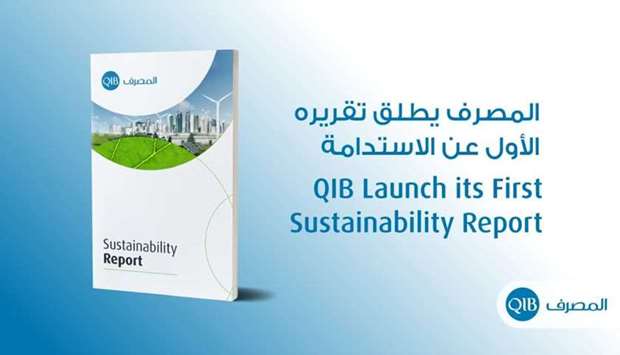Qatar Islamic Bank (QIB) has released its first sustainability report in line with Qatar National Vision 2030 and the recently launched National Strategy for the Environment and Climate Change.
The report highlights QIB’s efforts to contribute to the accomplishment of global sustainable development goals and highlights the bank’s achievements in implementing Environmental, Social, and Governance (ESG) standards.
The report is providing a high-level overview of QIB’s sustainability framework that covers the bank’s strategy, objectives, plans, and results as well as its positioning on the most important issues for its key stakeholders.
The bank’s sustainability framework consists of five pillars, crucial for supporting the bank’s goal in contributing to the growth of Qatar and to the country’s sustainable development in the future. The five pillars are Sustainable Finance, Responsible Banking, Governance, Ethics & Risk Management, and Empowering QIB’s People and Positive Community Impacts. These pillars and their corresponding topics reflect the bank’s strategic priorities to enable sustainable growth while delivering an outstanding customer experience.
QIB Group CEO Bassel Gamal said, “I am pleased to present our first sustainability report setting out our accomplishments and efforts deployed in 2020 to support all segments of society during these challenging times. While the world is emerging from the pandemic, it is essential to rebuild our societies in ways that will deliver sustainable benefits to our community, as well as the environment and the economy.”
He said, “Our sustainability report demonstrates our efforts to further integrate sustainability and environmental, social, and governance-related considerations at the core of our operations. We have recently formulated our future sustainability strategy, aligned with the objectives of Qatar National Vision 2030 as well as with the sustainability criteria developed by Qatar Stock Exchange and the UN Sustainable Development Goals.
“With these frameworks as a guide, important elements of our strategy include how we can enhance consideration of sustainability criteria in our financing activities, continue to support local communities, and take initiatives that reduce our environmental impact.”
Gamal added: “Our sustainability commitments are grounded in the belief that technology can help solve some of the most pressing challenges we face. As part of this, we have focused on digitalising our retail and wholesale products and services – to widen customer access, increase resource efficiency, minimise waste, and deliver better service.
“I take this opportunity to thank our board of directors and all our key stakeholders, including our employees, customers, shareholders, and other related parties for their trust and support during this transformational journey. We will work to build on our momentum by supporting Qatar’s economy, embedding ESG principles into our culture and risk management frameworks, and drawing on our sustainability achievements to ensure a better future for all.”
In the past few years, QIB has made significant contributions to Qatar National Vision 2030 by financing projects that are diversifying and decarbonizing the Qatar economy, increasing food security, and supporting the private sector and local communities. The progress on the bank’s sustainability initiatives will be shared annually, highlighting the investments and progress made in managing ESG factors.
QIB Sustainability Report is available on www.qib.com.qa.
The report highlights QIB’s efforts to contribute to the accomplishment of global sustainable development goals and highlights the bank’s achievements in implementing Environmental, Social, and Governance (ESG) standards.
The report is providing a high-level overview of QIB’s sustainability framework that covers the bank’s strategy, objectives, plans, and results as well as its positioning on the most important issues for its key stakeholders.
The bank’s sustainability framework consists of five pillars, crucial for supporting the bank’s goal in contributing to the growth of Qatar and to the country’s sustainable development in the future. The five pillars are Sustainable Finance, Responsible Banking, Governance, Ethics & Risk Management, and Empowering QIB’s People and Positive Community Impacts. These pillars and their corresponding topics reflect the bank’s strategic priorities to enable sustainable growth while delivering an outstanding customer experience.
QIB Group CEO Bassel Gamal said, “I am pleased to present our first sustainability report setting out our accomplishments and efforts deployed in 2020 to support all segments of society during these challenging times. While the world is emerging from the pandemic, it is essential to rebuild our societies in ways that will deliver sustainable benefits to our community, as well as the environment and the economy.”
He said, “Our sustainability report demonstrates our efforts to further integrate sustainability and environmental, social, and governance-related considerations at the core of our operations. We have recently formulated our future sustainability strategy, aligned with the objectives of Qatar National Vision 2030 as well as with the sustainability criteria developed by Qatar Stock Exchange and the UN Sustainable Development Goals.
“With these frameworks as a guide, important elements of our strategy include how we can enhance consideration of sustainability criteria in our financing activities, continue to support local communities, and take initiatives that reduce our environmental impact.”
Gamal added: “Our sustainability commitments are grounded in the belief that technology can help solve some of the most pressing challenges we face. As part of this, we have focused on digitalising our retail and wholesale products and services – to widen customer access, increase resource efficiency, minimise waste, and deliver better service.
“I take this opportunity to thank our board of directors and all our key stakeholders, including our employees, customers, shareholders, and other related parties for their trust and support during this transformational journey. We will work to build on our momentum by supporting Qatar’s economy, embedding ESG principles into our culture and risk management frameworks, and drawing on our sustainability achievements to ensure a better future for all.”
In the past few years, QIB has made significant contributions to Qatar National Vision 2030 by financing projects that are diversifying and decarbonizing the Qatar economy, increasing food security, and supporting the private sector and local communities. The progress on the bank’s sustainability initiatives will be shared annually, highlighting the investments and progress made in managing ESG factors.
QIB Sustainability Report is available on www.qib.com.qa.

